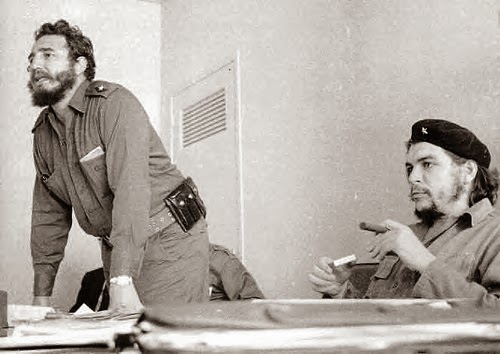 |
| Fidel Castro |
Corresponding text found on p232-245 in Brief History of the Caribbean.
After being pardoned by Batista, Castro is exiled to Mexico; plots return
Dec 1956 - Castro, Che Guevara, and about 80 men; Granma; land under fire and escape into mountains
July 26 Movement survives and grows in Sierra Maestra; by 1958, Movement (and Castro) seen as leaders in opposition to Batista
 |
| Castro & rebels in the Sierra Maestra |
March 1958 - US stops arms shipments to Batista
Summer 1958 - Cuban Army fails in attempts to drive out and defeat rebels; Movement begins counteroffensive through Cuba
Jan 1 1959 - Batista flees Havana; Che Guevara's forces take city; Castro begins triumphant caravan to Havana
 |
| Castro enters Havana triumphantly |
New government established, but all power rested with Fidel
Begins process of expropriation of property of established elites
May 1959 - Agrarian Reform Act; US govt protests
Propaganda war and Castro's 'charismatic authority'; Use of the Plaza de la Revolucion
 |
| Castro addresses a massive audience |
1960 - quick dissolution of Cuba-US relations; subsequent quick engagement of Cuba-Soviet relations
Oct 1960 - Eisenhower issues trade embargo of Cuba
Jan 1961 - US-Cuba diplomatic relations severed
Mass exodus of Cuban elite between 1959-1962
Operation Mongoose
Castro continues to consolidate power and purge threats
Creates Committee for the Defense of the Revolution
Castro's rhetorical mission is to create a 'new man' with a 'revolutionary conscience'
Catholics could not join Communist Party or attend university
Government took control of all news outlets
Government regulated morality
1961 - Massive literacy campaign
March 1962 - food rationing begins
October 1962 - Cuban Missile Crisis
Sino-Soviet dynamics in Cuban development (pragmatism v idealism)
Che Guevara headed Ministry of Industry; runs economy
 |
| Castro & Guevara lead the planning of the Cuban economy |
1965 - Guevara resigns govt positions; travels to assist Communist rebels in Congo
1966 - Guevara travels to Bolivia to plant Communist revolution; killed 1967
 |
| Che Guevara |
 |
| The famous Che Guevara |
By 1968, Castro had gotten rid of almost all private ownership in Cuba
Despite massive efforts to reform Cuban economic system, economy struggles dramatically
No comments:
Post a Comment
Note: Only a member of this blog may post a comment.